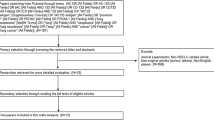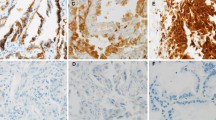Abstract
The aim of the study was to investigate the expression of two cancer stem cell markers CD133 and ATP-binding cassette superfamily G member 2 (ABCG2) in non-small cell lung carcinomas (NSCLC) and evaluate their prognostic values for postoperative relapse. The expression levels of CD133 and ABCG2 in 145 stage I NSCLC tumors were detected by immunohistochemistry. Positive CD133 and ABCG2 expression was defined in 31.7 and 37.9% of the NSCLC tumors, respectively. Both stem markers alone did not correlate with any of the clinicopathological characteristics and were insufficient to predict recurrence after surgery. However, our results showed that the dual expression of CD133 and ABCG2 (CD133+/ABCG2+) status was an independent predictor of postoperative recurrence for patients with stage I NSCLC. Furthermore, CD133+/ABCG2+ NSCLC tumors (33 cases, 22.8%) had a significantly higher microvessel density and higher expression levels of angiogenic factors than the other subgroups. In conclusion, this study suggests that NSCLC patients with the dual expression of CD133 and ABCG2 have a high risk of early relapse and might benefit from anti-angiogenesis therapy.


Similar content being viewed by others
References
Lau CL, Harpole DH Jr, Patz E. Staging techniques for lung cancer. Chest Surg Clin N Am. 2000;10:781–801.
Kitamura H, Okudela K, Yazawa T, Sato H, Shimoyamada H. Cancer stem cell: implications in cancer biology and therapy with special reference to lung cancer. Lung Cancer. 2009;66:275–81.
Salnikov AV, Gladkich J, Moldenhauer G, Volm M, Mattern J, Herr I. CD133 is indicative for a resistance phenotype but does not represent a prognostic marker for survival of non-small cell lung cancer patients. Int J Cancer. 2010;126:950–8.
Jiang T, Collins BJ, Jin N, Watkins DN, Brock MV, Matsui W, et al. Achaete-scute complex homologue 1 regulates tumor-initiating capacity in human small cell lung cancer. Cancer Res. 2009;69:845–54.
Ma S, Chan KW, Hu L, Lee TK, Wo JY, Ng IO, et al. Identification and characterization of tumorigenic liver cancer stem/progenitor cells. Gastroenterology. 2007;132:2542–56.
Zeppernick F, Ahmadi R, Campos B, Dictus C, Helmke BM, Becker N, et al. Stem cell marker CD133 affects clinical outcome in glioma patients. Clin Cancer Res. 2008;14:123–9.
Yoh K, Ishii G, Yokose T, Minegishi Y, Tsuta K, Goto K, et al. Breast cancer resistance protein impacts clinical outcome in platinum-based chemotherapy for advanced non-small cell lung cancer. Clin Cancer Res. 2004;10:1691–7.
Lee TK, Poon RT, Yuen AP, Ling MT, Wang XH, Wong YC, et al. Regulation of angiogenesis by Id-1 through hypoxia-inducible factor-1alpha-mediated vascular endothelial growth factor up-regulation in hepatocellular carcinoma. Clin Cancer Res. 2006;12:6910–9.
Zhou J, Tang ZY, Fan J, Wu ZQ, Ji Y, Xiao YS, et al. Capecitabine inhibits postoperative recurrence and metastasis after liver cancer resection in nude mice with relation to the expression of platelet-derived endothelial cell growth factor. Clin Cancer Res. 2003;9:6030–7.
Yamashita T, Forgues M, Wang W, Kim JW, Ye Q, Jia H, et al. EpCAM and alpha-fetoprotein expression defines novel prognostic subtypes of hepatocellular carcinoma. Cancer Res. 2008;68:1451–61.
Sun HC, Tang ZY, Li XM, Zhou YN, Sun BR, Ma ZC. Microvessel density of hepatocellular carcinoma: its relationship with prognosis. J Cancer Res Clin Oncol. 1999;125:419–26.
Zhang M, Song T, Yang L, Chen R, Wu L, Yang Z, et al. Nestin and CD133: valuable stem cell-specific markers for determining clinical outcome of glioma patients. J Exp Clin Cancer Res. 2008;27:85.
Shan YF, Huang YL, Xie YK, Tan YH, Chen BC, Zhou MT, et al. Angiogenesis and clinicopathologic characteristics in different hepatocellular carcinoma subtypes defined by EpCAM and alpha-fetoprotein expression status. Med Oncol 23 Jun 2010. [Epub ahead of print].
Karoubi G, Gugger M, Schmid R, Dutly A. OCT4 expression in human non-small cell lung cancer: implications for therapeutic intervention. Interact Cardiovasc Thorac Surg. 2009;8(4):393–7.
Ho MM, Ng AV, Lam S, Hung JY. Side population in human lung cancer cell lines and tumors is enriched with stem-like cancer cells. Cancer Res. 2007;67:4827–33.
Eramo A, Lotti F, Sette G, Pilozzi E, Biffoni M, Di Virgilio A, et al. Identification and expansion of the tumorigenic lung cancer stem cell population. Cell Death Differ. 2008;15:504–14.
Chen YC, Hsu HS, Chen YW, Tsai TH, How CK, Wang CY, et al. Oct-4 expression maintained cancer stem-like properties in lung cancer-derived CD133-positive cells. PLoS ONE. 2008;3:e2637.
Eyler CE, Rich JN. Survival of the fittest: cancer stem cells in therapeutic resistance and angiogenesis. J Clin Oncol. 2008;26:2839–45.
Ferrara N, Kerbel RS. Angiogenesis as a therapeutic target. Nature. 2005;438:967–74.
Acknowledgments
The work was supported by the Natural Science Foundation of Zhejiang Province, China (No. 2006C13021) and the National Basic Research Program of China (No. 2010CB944901).
Author information
Authors and Affiliations
Corresponding author
Additional information
Feng Li and Huazong Zeng contributed equally to this work.
Rights and permissions
About this article
Cite this article
Li, F., Zeng, H. & Ying, K. The combination of stem cell markers CD133 and ABCG2 predicts relapse in stage I non-small cell lung carcinomas. Med Oncol 28, 1458–1462 (2011). https://doi.org/10.1007/s12032-010-9646-5
Received:
Accepted:
Published:
Issue Date:
DOI: https://doi.org/10.1007/s12032-010-9646-5




